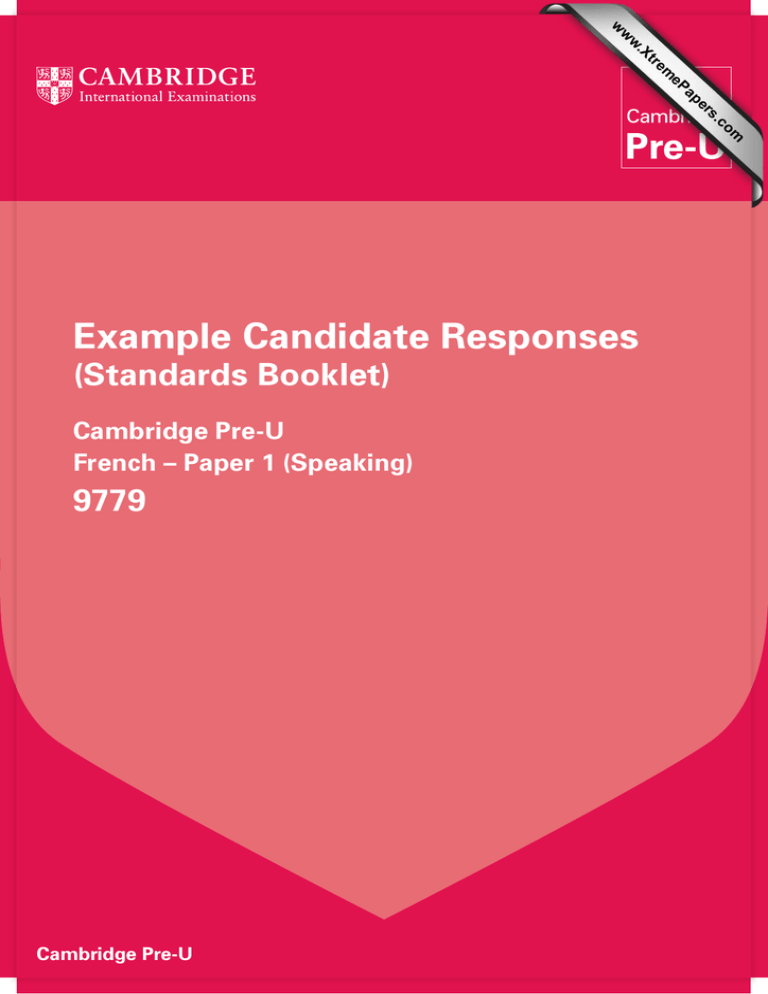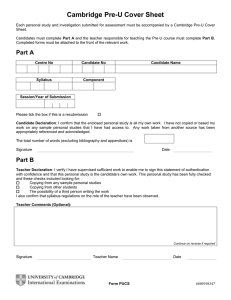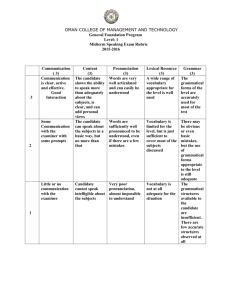Example Candidate Responses (Standards Booklet) 9779 Cambridge Pre-U
advertisement

w w ap eP m e tr .X w om .c s er Example Candidate Responses (Standards Booklet) Cambridge Pre-U French – Paper 1 (Speaking) 9779 Cambridge Pre-U Cambridge International Examinations retains the copyright on all its publications. Registered Centres are permitted to copy material from this booklet for their own internal use. However, we cannot give permission to Centres to photocopy any material that is acknowledged to a third party even for internal use within a Centre. © Cambridge International Examinations 2013 Contents Introduction ........................................................................................................................... 2 Components at a glance ....................................................................................................... 3 Part I: Newspaper article and related themes ....................................................................... 4 Part II: Prepared oral topic................................................................................................... 12 Introduction Introduction The main aim of this booklet is to exemplify standards for those teaching Cambridge Pre-U, and to show how different levels of candidates’ performance relate to the subject’s curriculum and assessment objectives. Cambridge Pre-U is reported in three bands (Distinction, Merit and Pass) each divided into three grades (D1, D2, D3; M1, M2, M3; P1, P2, P3). In this booklet a range of candidate responses has been chosen to illustrate each band. The examples selected are at D3, M3 and P3. Each response is accompanied by a brief commentary explaining the strengths and weaknesses of the answers. For ease of reference the following format for both parts of Paper 1 has been adopted: Part I/II information Mark scheme Selected card/topic Examiner comment Information about each part is followed by an extract from the mark scheme used by examiners. This, in turn, is followed by the card or topic that the candidate has selected to talk about, each with an examiner comment on performance. Comments are given to indicate where and why marks were awarded, and how additional marks could have been obtained. In this way, it is possible to understand what candidates have done to gain their marks and what they still have to do to improve their grades. The candidate recording that accompanies each examiner commentary is available to download from Teacher Support at http://teachers.cie.org.uk Past papers, Examiner Reports and other teacher support materials are available on Teacher Support at http://teachers.cie.org.uk 2 Cambridge Pre-U French Paper 1 Speaking 9779 Components at a glance Components at a glance Component Name Duration Weighting (%) Type of assessment 1 Speaking c. 16 minutes 25 Externally assessed oral 2 Reading and Listening 2 hours 15 minutes 25 Externally set and marked written paper 3 Writing and Usage 2 hours 15 minutes 25 Externally set and marked written paper 4 Topics and Texts 2 hours 30 minutes 25 Externally set and marked written paper This booklet contains examiner comments for a selection of example candidate responses (recordings) for Paper 1 (Speaking). An Example Candidate Responses Booklet for Papers 2, 3 and 4 can be found at Teacher Support http://teachers.cie.org.uk Overview of Paper 1 30 marks – overview of article for up to 1 minute, discussion for up to 3 minutes, broadening of the discussion for up to 4 minutes 30 marks – prepared topic discussion (about 8 minutes) Teachers are reminded that a full syllabus and other teacher support materials are available at www.cie.org.uk Cambridge Pre-U French Paper 1 Speaking 9779 3 Part I: Newspaper article and related themes Part I: Newspaper article and related themes Discussion of an article and related themes (about 8 minutes) Twenty minutes before the start of their oral, candidates will choose a newspaper article with a title in the target language and a general topic heading in English (maximum length 200 words) from a choice of four. Each article and heading will relate to one of the topic areas in the syllabus. Candidates will present an overview of the article to the Visiting Examiner for up to one minute. Then, in a discussion with the Examiner lasting for up to 3 minutes, candidates will put forward their opinions on the text and the issues arising from it. It is intended that the article will be a springboard for discussion, so a detailed analysis will not be required. The Examiner will broaden the discussion according to the general heading on the card (4 minutes). Dictionaries are not allowed. Candidates may make notes during the preparation time and use these as a prompt during the task. They must not read out prepared material. Mark grids will assess comprehension and discussion as well as linguistic competence. 4 Cambridge Pre-U French Paper 1 Speaking 9779 Part I: Newspaper article and related themes Mark scheme Cambridge Pre-U French Paper 1 Speaking 9779 5 Part I: Newspaper article and related themes Example candidate response – grade D3 Recording: 9779_12_French_ECR_Part1_D3.mp3 6 Cambridge Pre-U French Paper 1 Speaking 9779 Part I: Newspaper article and related themes Examiner comment – grade D3 Comprehension and discussion The candidate demonstrates very good understanding of the article and, although she has to ask for a couple of the questions to be repeated, she generally responds well and without undue hesitation. She shows herself able to develop and explain ideas and to express points of view, with some justification. Mark awarded = 11 out of 14 Range and accuracy Despite a number of errors which are sometimes of a serious nature (e.g. beaucoup des, les donner for leur donner, de les gens, on ne va changer, jusqu’à le moment), the language used is generally accurate, demonstrating a sound grasp of Pre-U structures. Tenses are, for the most part, accurate, concordances a little less so, and, despite the intrusion of a sprinkling of anglicisms, there is a positive attempt to introduce a range of vocabulary and structures. Mark awarded = 7 out of 10 Pronunciation and intonation The candidate’s pronunciation has a slight Hispanic ‘twang’ to it. Some silent final consonants are occasionally pronounced, there is confusion between the pronunciation of jeunes and gens and nasal sounds cause a few problems. These aside, the candidate’s pronunciation and intonation are generally good. Mark awarded = 4 out of 6 Total mark awarded = 22 out of 30 Cambridge Pre-U French Paper 1 Speaking 9779 7 Part I: Newspaper article and related themes Example candidate response – grade M3 Recording: 9779_12_French_ECR_Part1_M3.mp3 8 Cambridge Pre-U French Paper 1 Speaking 9779 Part I: Newspaper article and related themes Examiner comment – grade M3 Comprehension and discussion Despite some imprecision in her summary of the article, in the discussion that follows, the candidate demonstrates some ability to develop and explain ideas and to express opinions. There is some repetition in what she says but she manages to sustain the momentum. Overall, the candidate demonstrates an understanding of the article that is better than adequate and she is reasonably forthcoming in her responses. She has, therefore, been awarded a mark at the lower end of the ‘good’ band. Mark awarded = 9 out of 14 Range and accuracy The candidate makes use of a rather restricted range of vocabulary and structures and her discourse contains a number of anglicisms and quite frequent errors of an elementary kind, highlighting gaps in her knowledge of basic grammar. Examples of these are: les jeunes doit, moins gras, de les encourage de, obsessés avec, les jeunes personnes sont responsables pour sa propre santé, si ses parents ne donnent un bon exemple, habiter une vie, plus difficile de devient, buvent d’alcool, un bon façon à avoir un bon temps, à les cigarettes, ils n’entend pas à la publicité, il sera un bon idée à, de les drogues légales, aller à le médecin. Overall, the candidate shows sufficient evidence of grammatical awareness to be placed in the ‘satisfactory’ band. The candidate’s communication is sometimes impaired by errors, but much of what she says can be understood. She has, therefore, been placed at the higher end of the band. Mark awarded = 4 out of 10 Pronunciation and intonation The candidate persistently pronounces the final ‘s’ of ils and elles and there are a number of other errors of pronunciation, e.g. obèses, adultes, effets. However, generally speaking, pronunciation and intonation can be said to be good. Mark awarded = 4 out of 6 Total mark awarded = 17 out of 30 Cambridge Pre-U French Paper 1 Speaking 9779 9 Part I: Newspaper article and related themes Example candidate response – grade P3 Recording: 9779_12_French_ECR_Part1_P3.mp3 10 Cambridge Pre-U French Paper 1 Speaking 9779 Part I: Newspaper article and related themes Examiner comment – grade P3 Comprehension and discussion The candidate does not always understand the questions asked by the examiner and he shows considerable hesitation. Many of his responses are limited and occasionally it is not clear what he is trying to say. For example, towards the end of the test, when the examiner asked him if shops waste energy, he replies je pense parce que les lunettes dans le magasin souvent dans les magasins à nuit. Mark awarded = 6 out of 14 Range and accuracy Occasionally, the candidate is able to produce the necessary vocabulary and structures to convey his thoughts but there are clearly major gaps in knowledge of both grammar and lexis to the extent that he frequently struggles to express himself and communication is impaired in a number of places. Mark awarded = 3 out of 10 Pronunciation and intonation The candidate mispronounces many sounds, to such an extent that, on a number of occasions, what he is trying to say is not readily intelligible. Mark awarded = 2 out of 6 Total mark awarded = 11 out of 30 Cambridge Pre-U French Paper 1 Speaking 9779 11 Part II: Prepared oral topic Part II: Prepared oral topic Prepared topic discussion (about 8 minutes) Candidates will research a topic related to the history, current affairs or culture (including art, cinema, literature and traditions) of an area of the world where the target language is spoken. They will identify 5 to 8 headings within their topic, and submit these to Cambridge two weeks before the oral examination on the form provided. In the examination, candidates will be allowed to present their research for up to 1 minute (identifying interesting/contentious points in their topic, and reasons for choosing it) before discussion of the headings starts. Candidates can bring the headings into the examination to act as a prompt. They may also bring up to three pieces of visual material. Mark grids will assess knowledge as well as linguistic competence. 12 Cambridge Pre-U French Paper 1 Speaking 9779 Part II: Prepared oral topic Mark scheme Cambridge Pre-U French Paper 1 Speaking 9779 13 Part II: Prepared oral topic Example candidate response – grade D3 Chosen topic: La ‘Révolution Manet’ Recording: 9779_12_French_ECR_Part2_D3.mp3 Examiner comment Factual knowledge and opinions The candidate has prepared well and demonstrates very good understanding of the place occupied by Manet in the development of 19th century French painting. The candidate has chosen just two paintings, brought in copies of them and is well prepared to discuss them. Perhaps this choice is a little restrictive. Nonetheless, in the discussion she successfully puts forward relevant opinions that are discussed with a degree of confidence. She is, however, not always able to respond well when faced with an unexpected question from the examiner, for example, when asked her opinion as to what domain Manet was most successful in. Mark awarded = 11 out of 14 Range and accuracy There is a sprinkling of errors of a more basic nature (e.g. ont venu, qu’est-ce qui for ce qui, beaucoup des) and a few problems with genders and concordances, but accuracy can, nonetheless, be said to be very good. The candidate is able to use the vocabulary and structures necessary to be able to discuss her chosen topic with confidence. Mark awarded = 7 out of 10 Pronunciation and intonation Some silent final consonants are sounded (e.g. arts, Paris, client). There are a few problems with nasal and other sounds (e.g. Olympia, importe, excuse, texture, peinture) but, these aside, pronunciation and intonation can be described as good. Mark awarded = 4 out of 6 Total mark awarded = 22 out of 30 14 Cambridge Pre-U French Paper 1 Speaking 9779 Part II: Prepared oral topic Example candidate response – grade M3 Chosen topic: Pourquoi Marie Curie était-elle une scientifique influente à son époque et encore de nos jours? Recording: 9779_12_French_ECR_Part2_M3.mp3 Examiner comment Factual knowledge and opinions The candidate has prepared quite well and has a solid base of information that she has clearly thought about. She does not always target the question she is asked but, when she does, she shows some ability to develop and explain her ideas. Mark awarded = 9 out of 14 Range and accuracy The quality of language is inconsistent but, despite some errors (e.g. elle s’a appelé; sont éléments qui n’ont pas un grand significance utile), generally speaking, the candidate is able to use the vocabulary and structures necessary to describe and put forward some ideas on the achievements of Marie Curie. Complex structures are sometimes attempted, e.g. après avoir fini l’université; elle a découvert ces elements en séparant une autre compose. Mark awarded = 5 out of 10 Pronunciation and intonation The candidate persistently pronounces the final ‘s’ of ils/elles and there are a number of other errors of pronunciation, e.g. rayons and temps. However, overall, pronunciation and intonation can be described as good. Mark awarded = 4 out of 6 Total mark awarded = 18 out of 30 Cambridge Pre-U French Paper 1 Speaking 9779 15 Part II: Prepared oral topic Example candidate response – grade P3 Chosen topic: ‘Père Goriot’, de Balzac Recording: 9779_12_French_ECR_Part2_P3.mp3 Examiner comment Factual knowledge and opinions The candidate has chosen quite an ambitious literary topic. He clearly has some knowledge of his chosen text but he often struggles to express himself intelligibly and the examiner has to work hard to help him exploit the material he has prepared. Although he has some ideas, he is not always able to develop them because of linguistic constraints. Nevertheless, with prompts from the examiner, he is able to demonstrate a sufficient base of knowledge and offer adequate opinions to be awarded a mark in the ‘satisfactory’ band. Mark awarded = 7 out of 14 Range and accuracy The candidate often does not have the lexical means to express himself intelligibly, with the result that he is unable to present his material at all clearly. Overall, however, he demonstrates sufficient evidence of grammatical awareness to be awarded a mark at the higher end of the ‘satisfactory’ band. Mark awarded = 4 out of 10 Pronunciation and intonation Both the candidate’s pronunciation and intonation are quite heavily anglicised and many sounds are mispronounced (e.g. ‘simboles’ for symboles; final ‘p’ sounded in beaucoup; ‘Palace’ de Versailles for Palais de Versailles, etc.). Mark awarded = 2 out of 6 Total mark awarded = 13 out of 30 16 Cambridge Pre-U French Paper 1 Speaking 9779 Cambridge International Examinations 1 Hills Road, Cambridge, CB1 2EU, United Kingdom Tel: +44 (0)1223 553554 Fax: +44 (0)1223 553558 Email: info@cie.org.uk www.cie.org.uk © Cambridge International Examinations 2013 v1 3Y05 *8476067387*


